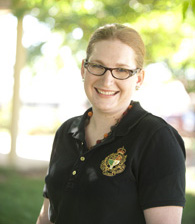When Compassion Creates Suffering Business School Professor Presents “Compassion Competence as a Social Dilemma” at the Strategic Management Society Conference
November 24, 2015

“In light of the horrific tragedy in Paris, we need to understand how compassion could cause “more harm” to those affected,” said Darcy Fudge Kamal, Ph.D., Assistant Professor of Strategic Management at the Argyros School of Business and Economics at Chapman University.
Kamal speaks from knowledge as a result of her current research and recent presentation “When Compassion Creates Suffering: Compassion Competence as a Social Dilemma,” which she discussed at the Strategic Management Conference in Denver. She was there on October 3-6, 2015 with Matthew McCarter from the University of Texas, San Antonio.
Kamal and McCarter’s new research considers when and why compassion organizing leads to suffering. Speaking further about the tragedies in Paris in relation to her studies, she said,
“We wish to help provide a sense of what acts of compassion could actually help those who have suffered from the event,” said Professor Kamal.
In the authors’ abstract, they use several examples of how acts of compassion could lead to suffering. They talk about Hurricane Sandy, saying that as many folks donated to aid relief from the natural disaster, an astounding 60 percent of the donated items went unused.
“In contrast, acts of compassion may dampen natural events, so that the magnitude of corrective events and the need for assistance grow,” said Kamal and McCarter in their extended abstract.
During this natural disaster, sorting through the clothing donations caused the nonprofits to become delayed from the more pressing issue of drying out and reconstructing communities. Charitable catastrophes such as Hurricane Sandy share a common problem, compassionate organizations aim to alleviate suffering but find many of their efforts unnecessary.
The authors also suggest that the relationship and imbalance between the giver and receiver negatively affect the compassionate organization.
It begins when the nonprofit or compassionate organization begins a relationship with the entity in need of help. The compassionate organization donates goods and trusts that the receiver will use the given resources to alleviate their suffering. On the other end of the spectrum, the receiver must also trust that the donor of goods/services or compassion provides an appropriate response that is effective enough to improve such conditions and offer help.
In order to resolve the dilemma, the authors propose, counterintuitively, that compassion organizers ask before they respond, “how can their actions harm those who they aim to resolve their suffering?” By considering a broader scope and scale of the problem at hand the compassion organizers are more likely to help resolve the problem.
Professor Kamal’s research interests include how trust, strategic alliances and buyer-supplier relationships improve firm performance. She studies unconventional industries such as the Thoroughbred horse industry to disentangle key questions on alliance strategy. Professor Kamal has published in the
Journal of International Business Studies
and the
Journal of Business Logistics
. She received her Ph.D. from the University of Minnesota.
